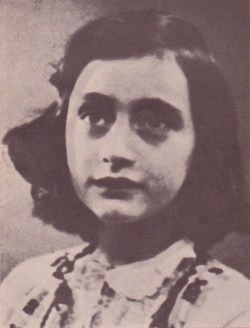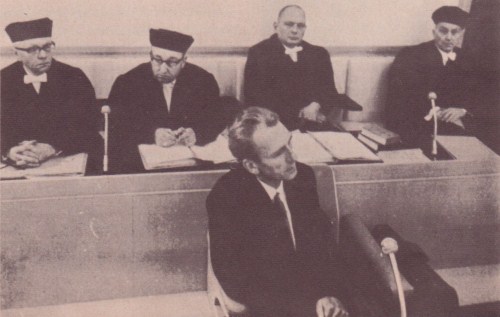Twenty-two S.S. men are facing a Frankfurt court, charged with the mass murder of Jews.
Read, in this first-hand report from our German correspondent, why they all deny their guilt.
And what the Germans today think about these trials.
TO GERMANS in World War II the name Auschwitz meant a concentration camp — a place of confinement for Jews, Gypsies and other "inferior" races. It was wrong, Adolf Hitler screamed, for these minority groups to pollute German society. It was right, Hitler decreed, to confine them — to expel them from whatever country Germany conquered.
 |
What If You Were a Jew?
To the Jews, however, expulsion did not mean mere eviction and confinement. To the outcasts it meant indescribable torture, violent death. To the condemned, Auschwitz was more than a concentration camp. It became a mass extermination centre.
It was here where a Polish general was mercilessly trampled to death. Here Russian soldiers were forced to endure wintry cold out in the open — until they dropped one by one from exposure. It was in this extermination camp where half-dead Jews crawled out of their graves. Here in Auschwitz three million Jews, Gypsies and others were ruthlessly tortured and methodically exterminated.
Wide World Photo
Anne Frank, the 12-year old Jewish girl who wrote famous diary later made into a motion picture. She described life in a garret in Amsterdam, The Netherlands, during Nazi reign of terror. Anne subsequently died in Nazi concentration camp after family was discovered.
Auschwitz is a small town 40 miles west of Krakow, Poland. Even though there were several hundred concentration camps throughout Germany, Austria and Poland, Auschwitz was the most dreaded of all. SS-man Rudolf Hess called it the "largest extermination camp of all times."
|
Who Was Responsible?
The twenty-two Hitler men on trial in Frankfurt unequivocally deny their guilt of any crimes committed against humanity. They claim not to have tortured anyone. They shot only in self-defense. Carried out orders from those above them. They were loyal soldiers, who did just what they were told.
This denial of guilt of mass murder is typical. These twenty-two men — all of whom held very high positions in Auschwitz — are no different from other Germans who have been brought before courts of justice since the war. They all have something in common — all deny their guilt. They merely obeyed orders of their senior officers, as obedient and loyal soldiers. Altogether 6,000 S.S. men did duty in Auschwitz during its four years of operation and not one is known to have refused to do what he was told.
A good example of this attitude — always placing the blame on those above them — was revealed in the Nurnberg trials held just after World War II. On trial were many of the top leaders of the Nazi Regime. Men like Goring, Hess, Jodl, von Papen, Doenitz and von Ribbentrop. Except for Hitler, there was no one over them in authority. Yet they also claimed they were simply obeying orders and consequently pleaded not guilty. Had Hitler been publicly accused of mass murder, he too would have believed himself innocent. He no doubt would have blamed the Jews for forcing him to take severe measures in dealing with them.
Grand Admiral Karl Doenitz, the man Hitler named to succeed him, has recently portrayed Adolf Hitler as a Jekyll-and-Hyde type who master-minded a small criminal gang. About the crimes committed against the Jews, Doenitz says: "I did not know the crimes, the exterminations of the Jews, which were committed behind the back of the German people and without their knowledge by a small clique of criminals. Today, I regard Hitler as a 'demonic character,' as one of the people who have good features as well as evil ones."
How it was possible for the successor to Hitler to know nothing about the extermination of the Jews is incomprehensible. According to Doenitz, it was Hitler and "a small criminal gang" who were to blame. Was it only a handful of Germans who knew and backed Hitler in carrying out his policy of exterminating the Jews?
Blaming others and pleading not guilty is, of course, no unique trait in the accused. No one wants to take the blame for exterminating six million Jews and Gypsies.
H. R. Trevor-Roper, Regius Professor of Modern History at Oxford, and author of The Last Days of Hitler, says about Doenitz' small gang of criminals: "These men were not unique: they were legion. They were the thousands of dull, unquestioning Germans who accepted the social fact of anti-Semitism even in its most hideous form." The Professor continues: "And if they accepted it once, why should they not accept it again?"
There is a clever saying in Germany, originated by a German, which goes something like this: "I'd sure like to shake the hand of any former Nazi who admits that he did wrong." But there just doesn't seem to be any — no, not a single one.
What Kind of People Are These Germans?
Let's take a closer look at some of the men standing trial in Frankfurt. Exactly what type of people are they? How do they really feel deep inside about the atrocities committed during the Third Reich, of which they constituted an integral part?
Take the case of Wilhelm Boger, one of the chief administrators in Auschwitz. According to several eyewitnesses and a variety of documents, his method of dealing with prisoners was to invent indescribable means of torture, by which the victim invariably met agonizing death.
At the end of the war Boger escaped and lived on a secluded farm for three years. Thereafter he was reunited with his family. He became a salesman, establishing himself as a respectable man in the community. Those around him knew nothing of his former life. People knew him as a kind and friendly man, who would lead his family in prayer at the dinner table.
But his past caught up with him. He was arrested a few years ago and is now facing a charge of mass murder. While in prison his daughter — having fallen in love with an Italian — asked his permission to marry. In replying to his daughter's request, he wrote: "It is a national shame for a German girl to marry an Italian." Note well that Wilhelm Boger did not make this statement during the terror reign of the Nazis. He wrote that letter to his daughter seventeen years after the war.
You would think a man in his situation — not only having been a prime witness to all the atrocities committed in Auschwitz, but also being personally responsible for the deaths of thousands of Jews — would show at least a small amount of remorse. Not so! As far as he is concerned whatever served the German cause was permissible.
Oswald Kaduk, another defendant, was well known at Auschwitz. With a gun in one hand and a bottle of whisky in the other, he would fire at random into massed prisoners. At one time he shot down 225 inmates. He soon became recognized as the most dreaded man in the camp.
After the war he was arrested by the Poles. Soon thereafter they handed him over to East Germany where he was imprisoned until 1956. After his release Kaduk got a job as a male nurse in a West Berlin hospital. There the patients befriended him. Everybody liked "good father Kaduk," as they called him. He treated the patients well, seemingly taking great pride in such humanitarian work.
|
Has Oswald Kaduk finally seen the light? Has he shown any signs of remorse? Is he regretting his former way of life, which meant death for thousands of captives?
"I was a good dog!" Kaduk told the examination board inquiring about his past record. "My job was to see that everything went orderly." His job, then, was to see that the extermination of "inferior" races proceeded in an orderly manner!
Thus far not one of the accused has suggested he may have done something wrong. Rather than being remorseful, they all defiantly maintain a certain unity among themselves in the trials.
Some have been in jail for two, three, and four years awaiting trial and have undoubtedly read what the Press has had to say about their deeds. But there is no sign indicating any change of attitude toward the past.
These men have, since World War II, found it extremely easy to again become an integral part of society. They don't appear eccentric. They don't act peculiar. There is nothing odd about them. They are just ordinary citizens, going about their everyday business. No one would think them to be anything but good, loyal citizens. It should therefore not be surprising to learn that four of the twenty-two standing trial in Frankfurt carry the title "Doctor."
|

Wide World Photo
Hitler's "Mercy Killer" on trial — Dr. Hans Hefelmann, former head of "Mercy Killing"
section, sits in defendant's stand. He was charged with murdering 73,000 persons in
Nazis' program of ridding Germany of physical and mental defectives. Hefelmann
confessed: "I always managed to make the best of even the most difficult situations"!
|